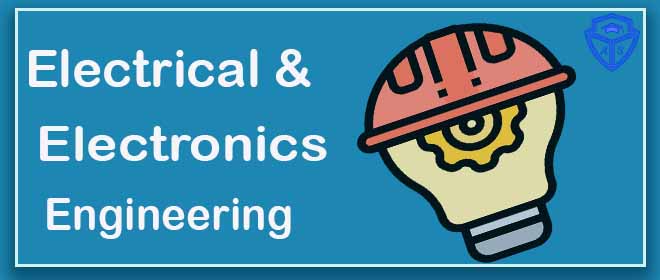
Electrical and Electronics Engineering
Updated On 28 Mar,2025

Electrical and Electronics Engineering (EEE) is a core engineering discipline that focuses on the study, design, and application of electrical systems, electronics, and electromagnetism. It plays a crucial role in various industries, including power generation, telecommunications, automation, and embedded systems.
Why Choose EEE?
✅ High demand in power, manufacturing, and technology sectors
✅ Broad scope with interdisciplinary applications (AI, robotics, IoT)
✅ Attractive salary packages and global career opportunities
Eligibility Criteria for EEE
| Criteria | Requirement |
|---|---|
| Education | 10+2 (PCM) with a minimum of 50%-60% (General), 40%-50% (SC/ST/OBC) |
| Age Limit | Minimum 17 years; varies for different exams |
| Entrance Exams | JEE Main, JEE Advanced, State & Private Exams |
Entrance Exams for EEE Admission
| Exam Name | Conducting Body | Institutes Covered | Mode of Exam |
|---|---|---|---|
| JEE Main | NTA | NITs, IIITs, CFTIs | Online |
| JEE Advanced | IITs | IITs | Online |
| BITSAT | BITS Pilani | BITS Campuses | Online |
| VITEEE | VIT University | VIT Campuses | Online |
| WBJEE | WBJEEB | West Bengal Colleges | Offline |
Tip: JEE Main is the most widely accepted entrance exam. If aiming for IITs, you must qualify JEE Advanced.
Top Colleges for EEE in India
IITs (Indian Institutes of Technology)
✅ IIT Bombay
✅ IIT Delhi
✅ IIT Madras
NITs (National Institutes of Technology)
✅ NIT Trichy
✅ NIT Surathkal
✅ NIT Warangal
Private Universities
✅ BITS Pilani
✅ VIT Vellore
✅ Manipal Institute of Technology
Tip: Government colleges offer excellent ROI due to lower fees and better placements.
Top Electrical and Electronics Engineering Institutes Worldwide
✅ Massachusetts Institute of Technology (MIT): https://www.mit.edu/
✅ Stanford University: https://www.stanford.edu/
✅ University of California, Berkeley (UC Berkeley): https://www.berkeley.edu/
✅ ETH Zurich – Swiss Federal Institute of Technology: https://ethz.ch/en.html
✅ University of Cambridge: https://www.cam.ac.uk/
Specializations within EEE
| Specialization | Focus Area |
|---|---|
| Power Systems | Electricity generation, transmission, and distribution |
| Embedded Systems | Microcontrollers, chip design, IoT |
| Control Systems | Industrial automation, robotics |
| Renewable Energy | Solar, wind, green energy tech |
| VLSI & Microelectronics | Semiconductor design, nano-electronics |
Career Opportunities in EEE
Top Job Roles
✅ Electrical Engineer
✅ Power Systems Engineer
✅ Electronics Design Engineer
✅ Control & Automation Engineer
✅ Embedded Systems Developer
✅ Renewable Energy Specialist
Top Hiring Companies
| Sector | Companies |
|---|---|
| Government | BHEL, NTPC, DRDO, ISRO |
| Private | Tata Power, Siemens, Schneider Electric |
| Tech | Intel, Texas Instruments, Qualcomm |
Salary Trends for EEE Graduates
7. Admission Process for EEE
Step-by-Step Guide
1️⃣ Choose the Right Exam – JEE, state-level exams, or private university exams.
2️⃣ Apply for the Exam – Register on official websites.
3️⃣ Prepare Well – Use NCERT books, mock tests, and coaching.
4️⃣ Appear for the Exam – Secure the required rank.
5️⃣ Participate in Counseling – Choose colleges based on rank.
6️⃣ Document Verification & Fee Payment – Finalize admission.
8. Scholarships & Financial Aid for EEE Students
| Scholarship | Eligibility |
|---|---|
| Central Sector Scholarship | Top 20% of Class 12 students |
| AICTE Pragati & Saksham | For female and differently-abled students |
| Reliance Foundation Scholarship | Merit-based for engineering students |
Tip: Many state governments offer scholarships for engineering students based on merit and financial background.
Industry Trends & Future Scope of EEE
Emerging Technologies in EEE
✅ Smart Grids & IoT Integration
✅ Electric Vehicles (EV) & Charging Infrastructure
✅ AI & Automation in Power Systems
✅ Renewable Energy Expansion
Expert Tips for Aspiring EEE Students
- Start Early with Basics – Focus on NCERT textbooks and conceptual clarity.
- Practice Mock Tests Regularly – Helps improve accuracy and time management.
- Internships & Projects – Gain hands-on experience to stand out in job applications.
- Network with Alumni & Industry Professionals – Helps in career growth and mentorship.
- Stay Updated on Industry Trends – Follow tech news, attend webinars, and explore new technologies.
FAQs (Frequently Asked Questions)
Q1: What is the difference between Electrical and Electronics Engineering?
A: Electrical Engineering focuses on power systems and high-voltage applications, while Electronics Engineering deals with low-voltage circuits, semiconductors, and embedded systems.
Q2: Which entrance exam is best for EEE admission?
A: JEE Main is widely accepted, but if you aim for IITs, you need to qualify JEE Advanced. Private universities conduct their own entrance exams like BITSAT, VITEEE, and SRMJEEE.
Q3: What are the best specializations in EEE for future jobs?
A: Power Systems, Embedded Systems, Renewable Energy, and VLSI are high-demand fields.
Q4: Does EEE have scope in Artificial Intelligence and Robotics?
A: Yes, AI and robotics rely heavily on electrical systems, automation, and embedded systems, making EEE graduates highly valuable.
Q5: What is the average salary after EEE?
A: Freshers earn between ₹4-8 LPA in core companies, while experienced professionals in top industries can earn ₹15+ LPA.
Conclusion
Electrical and Electronics Engineering (EEE) offers a vast array of career opportunities and plays a crucial role in shaping the technological future. Whether you aim for government jobs, private sector roles, or higher studies, EEE provides a strong foundation to excel in various domains.
Next Steps:
Research entrance exam requirements and apply on time.
Choose the best college based on your rank and preference.
Stay updated on industry trends and continuously upgrade your skills.
For more detailed admission guidance, stay tuned to Admission Solver!